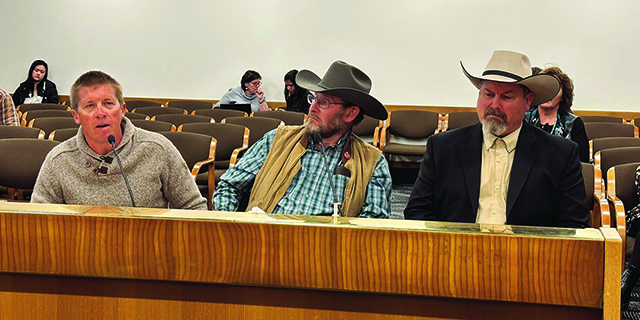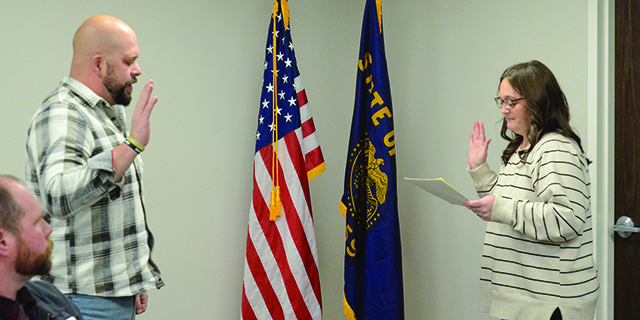GUEST COLUMN: Local foods’ prominence on the rise
Published 4:00 pm Tuesday, November 20, 2012
Potlucks and pie socials have always been a part of the social life in Wallowa County. But if youve noticed a growing interest in and availability of local foods, youre in tune with the times. There are two main reasons for the current food fervor one of them from outside our region and the other from within.
Nationwide, the food movement is a cultural phenomenon that has brought new focus on what we eat. It is evident everywhere from televisions 24-hour Food Network to the supermarket to the farmers markets. Whether dining out or cooking at home, Americans have never had so many food choices. Even here in rural Oregon, you can buy aged balsamic vinegar and imported olive oil as well as a range of organic products, from green grapes to milk to all-purpose flour.
Trending
Along with the organics trend, the rise of farmers markets is another sign of the broad-based food movement. Across the country, more people are are willing to go the extra mile to buy high-quality foods that support local, small-scale farmers. With the addition of the Lower Valley Farmers Market in Wallowa this past year, every town in Wallowa County now has a weekly farmers market during the growing season. In addition to Dollar Stretcher and Joseph Family Foods two markets that occasionally sell local produce, these farmers markets provide reliable places for everyone including families using EBT cards to eat homegrown.
Locally grown is more than a nice, and even nutritious notion. Wallowa County is already renowned for the exceptional quality of its commodity products, including hay, wheat and beef. Now, the food movement is providing new market opportunities for many more products grown and made in Wallowa County, especially those produced on a small scale. The production, processing and distribution of local food can profoundly and positively impact our local economy.
This is the reason why you may have caught the buzz about local food system development here at home. We are only starting to appreciate the full potential (in the millions) of our agricultural riches for export and for sale within the county.
One group working to coordinate a variety of local food efforts is the Wallowa County Food System Council. There is no governing board or staff, no funders or advisors. It is a collection of community members who are making headway in a grand vision: to grow an equitable, local food system that promotes economic development, community development and sustainable agriculture.
One of the main stepping-stones to the progress in developing a cohesive local food system came from the summer 2012 publication of the Community Food Assessment conducted by an AmeriCorps volunteer through the Oregon Food Bank. Based on three priorities identified in the report, last month the Food System Council developed a strategic plan for the next 12 months that will enhance communication, coordination and support among all of the partners including Community Connection, NEOEDD, Magic Garden, Wallowa County Farmers Market, Lower Valley Farmers Market and Slow Food Wallowas.
While policy councils and meetings dont sound inspiring, this group is rapidly acting on those plans to create producer networks and school curricula, identify funding sources and barriers to growth and much more. Expect to see many more food-forward projects come into being throughout the coming year that benefit the entire community in ways that youd never have imagined.
Trending
Here is a sampling of recent significant achievements through the work of many groups and individuals that are building our local food system:
USDA meat processing plant: Staffords in Elgin is now processing local beef for retail sale. It is one of 12 meat processors in Oregon and the only one in eastern Oregon.
Indoor farmers market: The Lower Valley Farmers Market has moved indoors to the Telephone building in Wallowa. Buy local eggs, chicken, beef and storage crops of squash, potatoes and apples along with pickles and preserves.
Expanded community gardens/farm to school: Both the Magic Garden and the Lower Valley Farmers Market received grants from the Bishops Initiative to Eliminate Hunger through the United Methodist Church to significantly expand their plots and provide more food to more families, schools and food pantries.
Producer Network: Based in Lostine, this new resource provides field processing, refrigerated transport, storage and other infrastructure needs for growers in the lower valley.
Slow Food Wallowas has grown their general membership and engaged new board members, hosted public events that celebrate the availability and quality of locally produced foods, and raised funds to support local food projects, such as the Magic Garden.
A Joseph resident, Lynne Curry is the author of Pure Beef: An Essential Guide to Artisan Meat with Recipes for Every Cut (Running Press, 2012) and the co-chair of Slow Food Wallowas.









